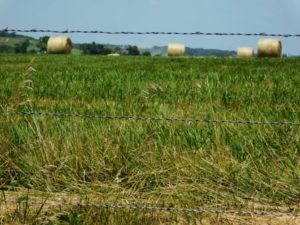
Hay bales, wheat, soybeans, and corn, those are the normal scenes in rural Kansas during the summertime.
But a new alternative crop is possible in the summer of 2019.
Hemp production has come to Kansas following Former Governor John Colyer’s enactment of the Alternative Crop Research Act in April 2018.
Bourbon County Counselor Justin Meeks, of the Bourbon County Commission, was asked to provide information to the commission on hemp.
“Hemp is not marijuana,” Meeks said. “The size is different, the hemp plant is much bigger. And you can’t get high from hemp.”
There are three people, called licensees, legally planting hemp in Bourbon County, according to Jason Walker, Public Relations Director for the Kansas Department of Agriculture.
Regulations and procedures for planting hemp in Kansas are quite rigorous, Meeks stated.
None the less, there are those who have started planting.
“As of July 22, 2019, the Kansas Department of Agriculture has received the notification, through required planting reports, that roughly 1170 acres of industrial hemp have been planted in Kansas,” Walker said. He noted that 65 acres are licensed (potential) acres in Bourbon County.
Joe Bisogno, Jr. started growing hemp on eight acres on a small acreage in Bourbon County this month, he said.
He prefers not to give the location of the area where he is growing the hemp “So people won’t try to come to look at it,” he said.
“When you license to grow hemp, you can’t have anybody in the designated area, they can’t come on the property,” Bisogno said.
“The application process involves each person that touches the field (where hemp is produced) has to get a background check,” Meeks said.
Bisogno said he traveled the country to see how to plant, process and harvest the plant first hand, before taking the plunge into growing hemp.
“Joe Bisogno Jr. and Joe Bisogno Sr. have done a lot of work at the legislative level for hemp production,” Meeks said. “They deserve credit for that.”
The recent planting on Joe Jr.’s small acreage is for research purposes, he said.
“I’m doing research on the hemp,” he said. “I plan to compare how hemp grows in two different soil types.”
“I’m planting it for CDB oil,” Bisogno said.
CDB is an abbreviation of cannabidiol, a compound found in marijuana plants, according to https://sciencetrends.com/what-does-cbd-stand-for/
Bisogno is planting the hemp for economic reasons.
“You can make money on a small acreage,” he said.
“It’s easily a billion-dollar industry,” Meeks, said. “There are thousands of articles that can be made from hemp, such as flooring and clothing.”
Here is the history of how Kansans came to grow hemp, provided by Kansas government links.
Then-Governor Jeff Colyer, M.D. signed Senate Bill 263 ( K.S.A. 2-3901 et seq.) in April 2018, which enacted the Alternative Crop Research Act allowing the Kansas Department of Agriculture to oversee the cultivation of industrial hemp in a research program, according to the website https://www.agriculture.ks.gov/divisions-programs/plant-protect-weed-control/industrial-hemp
“The KDA legal staff and plant protection and weed control program staff quickly began the process of developing regulations and other administrative documents and procedures to guide the Alternative Crop Research Act, according to the website.
“Since that time, KDA staff participated in more than 14 public outreach events across the state, which began with an open dialogue and information exchange at a public forum May 11 and included a public hearing prior to publishing the regulations.
“The regulations were approved by the Department of Administration and the Attorney General and reviewed by the Legislative Joint Committee on Administrative Rules and Regulations before final regulations were published in the Kansas Register on Jan. 24, 2019. They became effective on Feb. 8, 2019, 15 days following their publication.
“The Industrial Hemp Research Program became possible because the 2014 Farm Bill included a section to allow for universities and state departments of agriculture to begin cultivating industrial hemp for purposes of research, provided that the growing and cultivating of industrial hemp is allowed under state law.
“Industrial hemp is defined by SB 263 as all parts and varieties of the plant cannabis sativa L that contain a delta-9 tetrahydrocannabinol (THC) concentration of no more than 0.3 percent on a dry weight basis.
“The recent passage of the 2018 Farm Bill removed federal restrictions on the establishment of commercial hemp programs and allows individual states to develop a plan to license the commercial production of hemp and further directs the U.S. Department of Agriculture to develop a plan for states that do not do so.
“In order to establish a program for the commercial production of industrial hemp, Kansas must develop a plan through KDA, in consultation with the Governor and Attorney General. Any such plan must be submitted to USDA for approval.
“The opportunity to grow a new specialty oilseed crop in Kansas offers potential for diversification for Kansas farmers looking for an alternative crop, or for new farming enterprises interested in cultivating industrial hemp.
“The Kansas agriculture industry has developed a statewide strategic growth plan in recent years, and is committed to pursuing new and innovative opportunities to grow agriculture.
“The research generated by participants of this new industrial hemp program will be valuable data in identifying the growth potential offered in this sector.”